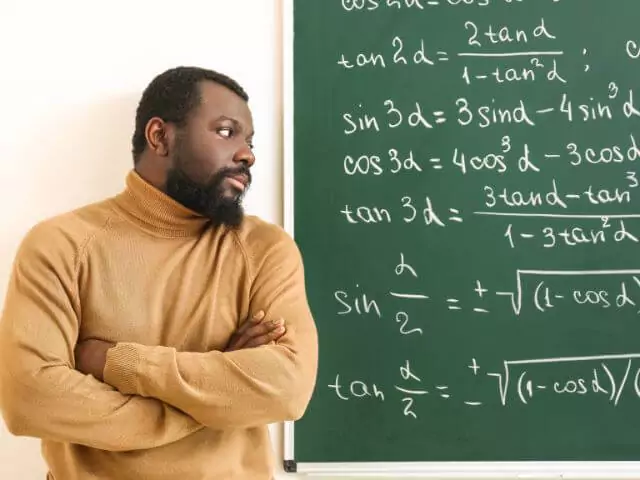What Does a Maths Teacher Do?
 When considering a career as a Maths Teacher it’s important to have a solid understanding of the role of a Maths Teacher and what a working day will look like. Maths is an essential and compulsory subject for students in the UK and is a requirement for many higher education courses. A Maths Teacher is responsible for helping students develop a problem-solving mentality and a passion for numeracy and mathematics. Turning each of their students into critical thinkers, they help them develop key skills and knowledge in line with the national curriculum that will last well into adult life.
When considering a career as a Maths Teacher it’s important to have a solid understanding of the role of a Maths Teacher and what a working day will look like. Maths is an essential and compulsory subject for students in the UK and is a requirement for many higher education courses. A Maths Teacher is responsible for helping students develop a problem-solving mentality and a passion for numeracy and mathematics. Turning each of their students into critical thinkers, they help them develop key skills and knowledge in line with the national curriculum that will last well into adult life.
Maths Teachers are also required to:
- Develop lessons in line with national education standards, along with the preparation of all activities and materials
- Attending parent and Teacher meetings and conferences
- Monitoring individual student development and ensuring the students are reaching academic benchmarks
- Marking homework and providing feedback to the student to ensure the information they are taught is being retained
- Maintain their development and ensure they keep up to date with teaching practices and policies
- Create an inclusive and engaging atmosphere where pupils are challenged and motivated to learn
How To Become A Maths Teacher
- Complete Undergraduate Degree
Focusing almost entirely on the study of mathematics, an undergraduate maths degree is a higher education course which is completed at the university level. It covers a selection of related topics such as:
- Algebra
- Calculus
- Geometry
- Differential equations
- Probability
- Problems solving and more
The degree will prepare you for careers which require logical, critical, and strategic thinking, with many graduates choosing to pursue careers in finance, IT, education and even politics.
Students looking to get started on an undergraduate maths course should be able to display confidence and proficiency in Mathematics alongside 5 GCSEs (or equivalent). Two of these GCSEs must be English and Maths and all are graded C/4 or above. Additionally, some universities may require students to have achieved A Levels and even pass an entrance exam that will allow them to demonstrate their mathematical capability.
Whilst the average completion time for an undergraduate degree is approx. 3 years with full-time study, some courses can take as much as 4 years with the inclusion of a placement year and a master’s qualification. As part of the undergraduate degree, students will complete several courses and assessments ranging from coursework to exams and assignments.

Can You Be a Maths Teacher Without a Degree?
Yes. Many people believe that to become a Maths Teacher you must go to university and achieve a degree in maths, which is no longer the case. Time and money heavily influence a person’s ability to pursue higher education, especially those with full-time jobs and family commitments, which leaves little time to fit in a full-time uni course.
University is undoubtedly the recommended path to qualification if you have the ability to pursue this route, however, for those that don’t, all is not lost. Providing you’re qualified to at least a Level 3 standard and you are a member of SET, you can apply QTLS status (Qualified Teacher Learning and Skills) which is comparable to QTS and recognised by many schools across the UK.
The application for QTLS is quite simple. Upon successful completion of learndirect’s Level 5 Diploma in Education and Training (RQF) you will be able to apply for your QTLS through your SET membership (Society for Education and Training).
- What Post-graduate Courses are Useful in Maths
Anyone looking to take their maths career to the next level should consider a postgraduate degree which will teach them the skills they need to excel in more specific areas of maths. There are several programs available, including Masters and PhD courses, that offer specific training in different areas of mathematics such as financial mathematics, applied mathematics, data and computational mathematics, and statistics. The content of these courses is developed to provide students with the refined knowledge needed to succeed in their chosen careers. What’s more, these programs can lead to a number of exciting R&D opportunities, as well as academic roles with leading universities.
- How to Get Hired as a Maths Teacher?
Your new qualification will have you classroom-ready with the skills needed to inspire young minds, but actually getting hired for a role is up to you. Regardless of the type of school you wish to work in, there are several things you can do to help you throughout the job search and application process and ensure you give yourself the best chance at landing the right post for you.

Find the Right Opportunities
As with other forms of job search, the best places to keep updated are the traditional job boards. There are also a number of niche job board sites specific to opportunities within the education sector. Alongside this, you will find that many schools advertise their roles on their website and social media pages as well as through their local governing body. Look for schools in your area and send them a copy of your CV. Even if they aren’t directly advertising, they may be aware of an opportunity coming available that you can get advance notice of.
Your CV is Key
Your CV in most cases will be the first impression a school will have of you. For this reason, it’s essential that you keep it current and up-to-date with any experience and qualifications. To support your CV, it's recommended that you include a cover letter specific to the role and school you are applying for. By doing this you’ll increase your chances of being invited for an interview.
Keep Organised
In the early stages of qualification, you will likely have a lot of newly issued paperwork that needs to be saved. This paperwork can be anything from DBS checks to your qualification itself. This documentation is often required before the interview and almost certainly before you start, as such it's suggested that you keep both physical and digital copies where possible. Whilst replacements can usually be sourced, it adds unnecessary time and effort to what should be a straightforward process.
- Renewal of Accreditations
As you move through your career, your qualifications will expire and become outdated, which makes the renewal of your qualifications essential to building a successful career in education. This will ensure you remain updated on the latest teaching practices and policies and that your knowledge and skill set remains relevant. Whenever you are issued a qualification or certificate, it’s recommended that you add the expiry date to your calendar to ensure the date isn’t missed.
How Much Does a Math Teacher Earn?
The amount you are likely to earn is no doubt something you’re keen to identify if you’re considering a career in education. Maths Teachers’ salaries are influenced by several factors, such as their experience and location. While the reason that most people choose to pursue a career in education is rarely salary based, it’s still an important thing to consider, as with any other job. The earning potential for Maths Teachers in the UK ranges from the UK living wage to over £35,000. The average salary for a Maths Teacher in the UK is £36,400 (20 February 2023 according to Talent.com).
If you look at the salaries for opportunities in your area, this should provide you with an accurate representation of your expected earnings.
learndirect can help you gain the qualifications you need without going to university, so if you're considering a new career as a Maths Teacher we can help. Upon completion of the Level 5 Diploma in Education and Training (RQF), you will be able to apply for QTLS status, with the peace of mind that the skills you gain on the course satisfy the entry requirements for this status.
Get started on the road to becoming a Maths Teacher and speak with one of our Course Advisors today. We’d love to hear more about your career plans and help you gain the qualifications you need to become a Maths Teacher.
Call us now on 01202 006464 or speak to us online here.
Alternatively, download our FREE Teaching and Education Faculty Brochure below for more information.



















